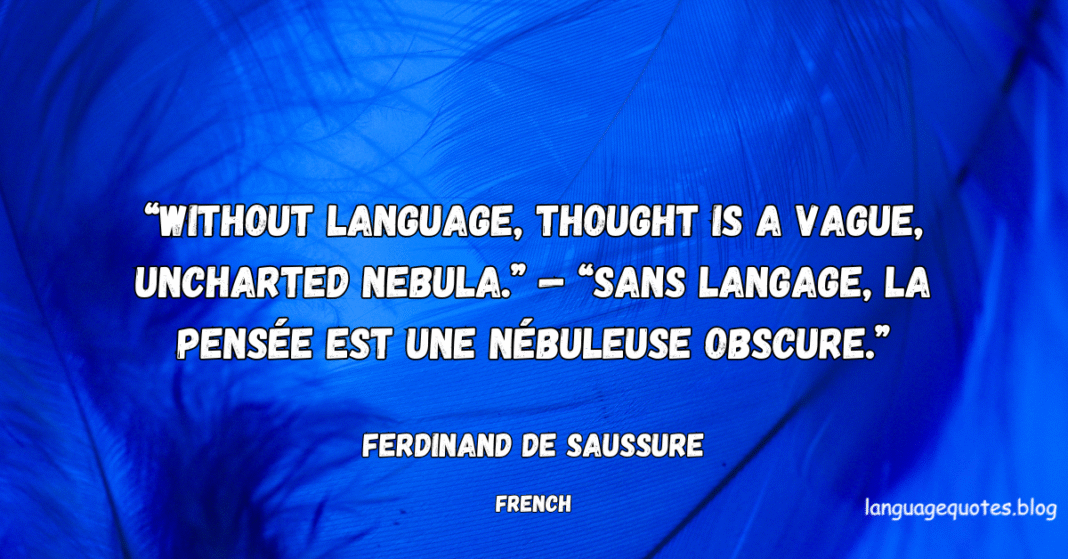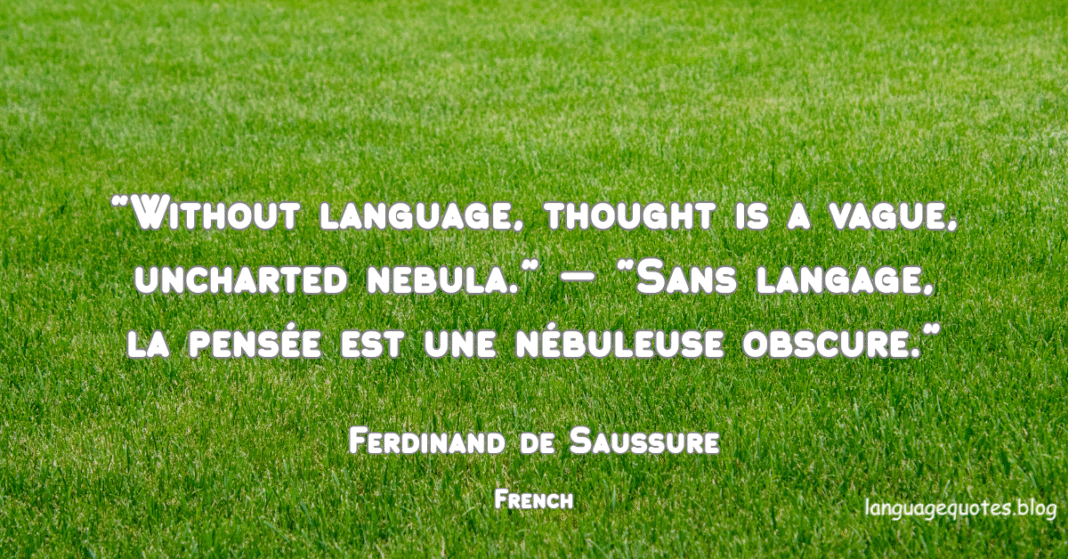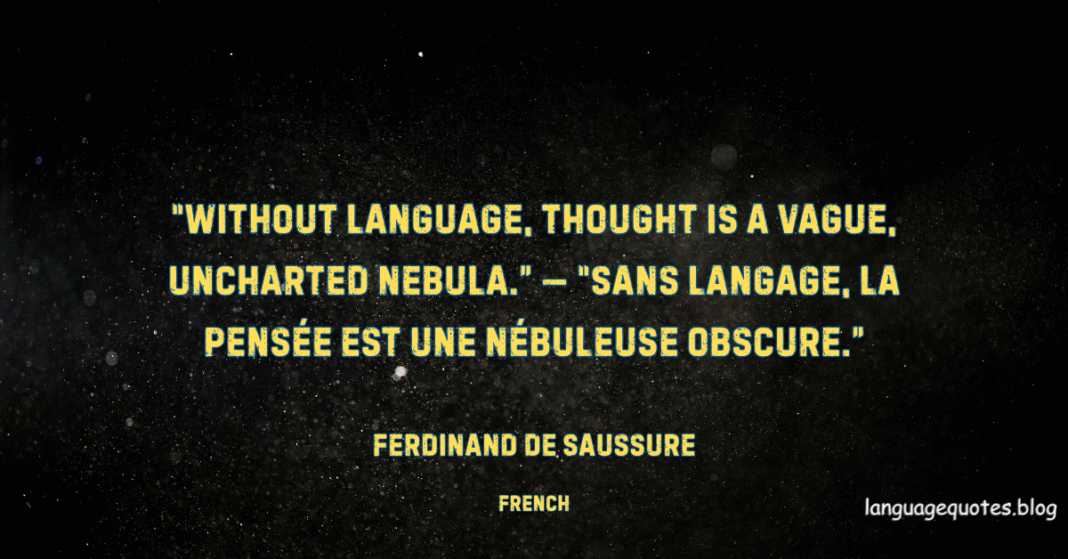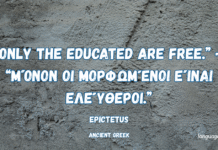“Without language, thought is a vague, uncharted nebula.”
French: “Sans langage, la pensée est une nébuleuse obscure.”
— Attributed to Ferdinand de Saussure
🗨️ Two-Line Commentary:
Saussure’s insight reminds us that without language, even the most powerful ideas remain hidden in fog. It is through words that the chaos of thought becomes creation.
🧠 Introduction: Language as the Foundation of Thinking
Language is more than a communication tool—it is the very framework through which human thought takes form. The quote, “Without language, thought is a vague, uncharted nebula,” often attributed to Swiss linguist Ferdinand de Saussure, eloquently captures this fundamental truth.
Here, thought is compared to a nebula—a swirling mass of cosmic dust, undefined and formless. Without the structure and clarity of language, our thoughts remain cloudy, unshaped, and inaccessible. This metaphor beautifully expresses the idea that language is the mechanism that crystallizes thought—that to think clearly, one must first speak or write clearly.
📖 Who Was Ferdinand de Saussure?
Ferdinand de Saussure (1857–1913) is widely regarded as the father of modern linguistics. His work laid the foundation for structuralism, a field that explores the relationships between signs and meanings in language. His lectures, compiled posthumously in Cours de linguistique générale (Course in General Linguistics), revolutionized how we understand language not just as a tool, but as a system that shapes human reality.
Although the quote in question does not appear verbatim in his published texts, it summarizes his core belief: that language and thought are inseparable. Language, for Saussure, is not just a passive medium; it is a system of signs that actively organizes how we perceive, categorize, and express our world.
🌌 Thought Without Language: A Cognitive Nebula
The comparison of unexpressed thought to an “uncharted nebula” is a striking image. Just as a nebula contains the potential for stars but remains a chaotic cloud until condensed, raw human thought is full of potential—but lacks clarity until shaped by language.
Have you ever had a feeling, insight, or idea that felt profound—yet the moment you tried to express it, it slipped away? That fleeting experience is the mental nebula Saussure’s concept points toward. Until we give form to our ideas through words, they remain unreachable—even to ourselves.
🧬 Language and the Formation of Meaning
Saussure introduced the idea of the “sign” in linguistics, composed of:
-
The signifier (the word or symbol), and
-
The signified (the concept or idea behind the word).
This duality is essential to understanding how language constructs meaning. Without signs, concepts float in a haze. We may sense them, but we cannot fully access or apply them.
Language doesn’t just describe reality—it constructs our understanding of it. When we label something, we don’t merely identify it—we define it, give it context, and relate it to other ideas. In this way, language is the scaffolding of cognition.
🧩 The Psychology of Language and Thought
Modern psychology supports Saussure’s linguistic theory. Studies have shown that people who lack specific words for emotions or concepts struggle to recognize or express them. This is known as linguistic relativity—the idea that the language we speak influences the way we think.
Without the right words, a person may feel confused or emotionally overwhelmed. But once they articulate what they’re experiencing—say, by naming it “anxiety” or “nostalgia”—they gain control and clarity. This is why journaling, therapy, and even inner dialogue are so effective: they transform nebulous feelings into structured thought.
📝 The Writer’s Perspective: Words as Precision Tools
Writers and poets especially understand this concept. The hardest part of writing is often not the idea, but the expression of that idea. The difference between a vague impression and a powerful narrative lies in the choice of words.
In this sense, language is not just expressive—it is creative. Writers do not just describe reality; they shape it. Saussure’s philosophy affirms that thought becomes fully real only when it is framed in language.
🌐 Cultural and Societal Implications
Language is not only personal—it is cultural. It reflects the shared concepts, values, and beliefs of a community. When Saussure says that thought is vague without language, he also implies that our collective understanding—our histories, philosophies, even laws—are possible only through shared linguistic systems.
This is why the loss of a language is so devastating. With every extinct tongue, we lose not just words, but worldviews. We lose idioms of emotion, metaphors of memory, and visions of life that were unique to that community.
🔚 Conclusion: Giving Shape to the Nebula
The quote “Without language, thought is a vague, uncharted nebula,” attributed to Ferdinand de Saussure, expresses a timeless truth. Language is the bridge from mind to reality, from private sensation to public understanding. Without it, our thoughts remain swirling, shapeless, and inaccessible.
Language gives form to emotion, structure to memory, and clarity to insight. It is not the servant of thought—it is its shaper. And as we expand our vocabulary, master new languages, and learn to articulate more precisely, we also expand the boundaries of our inner world.









